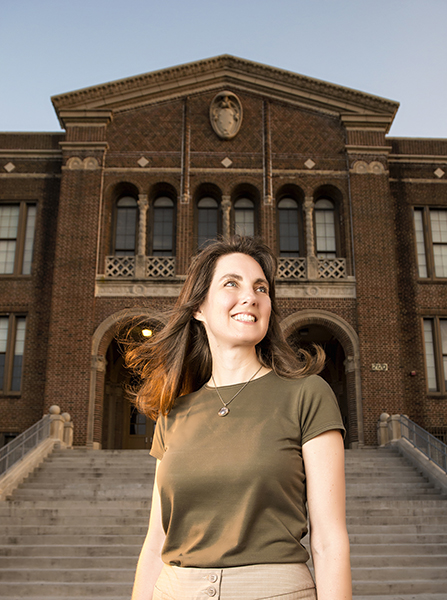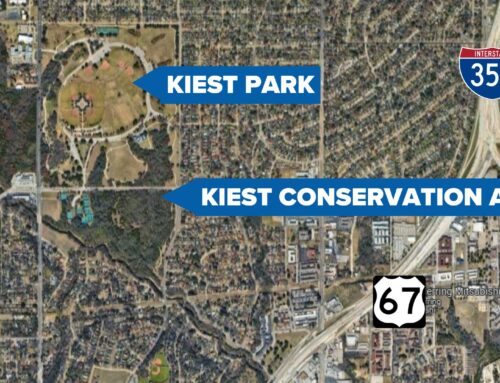
Audrey Pinkerton (Photo by Danny Fulgencio)
Audrey Pinkerton on her campaign, choice schools, over-testing and more
The new Dallas Independent School District trustee representing much of Oak Cliff is Audrey Pinkerton, the 47-year-old owner of a commercial construction and consulting company called Forward Concept. Pinkerton replaces Eric Cowan, who served two three-year terms. She graduated from a DISD school, Thomas Jefferson High School, in 1986. She and her husband live in Kessler Park, and they raised two daughters through DISD schools; one is in college and one is a student at DISD’s high school arts magnet. When we met with her in July, she was putting in at least 20 hours a week as a trustee, a volunteer position. Pinkerton ran against Dallas County Community College administrator Isaac Faz, in an election that has been described as among the most contentious in Oak Cliff memory. It’s all water under the bridge now, Pinkerton says, and she was reluctant to talk about it. But we coaxed it out of her anyway.
This is a big question, but what is the first thing you want to accomplish?
All the schools in the district should become schools of choice. That means they’re offering something other than the standard curriculum. Of course, Greiner is our arts magnet that most people know about now. Whether that’s STEM or arts curriculum or something else that attracts parents to schools.
The first thing a young family does when they move to a neighborhood is start asking around, “Where should I send my kids to school?” A real estate agent told me, “Rosemont … that’s where everybody sends their kids.” What people don’t know is there are many other great schools. For example, the dual-language program at Rosemont is very popular, but many people don’t know that Hogg and Winnetka also have dual language programs. So we’re starting to see some interest from families in those neighborhoods. We need to be focusing our attention on where we have gaps between what parents want and what our schools offer, and help the board close that gap.
What goals do you have for your three-year term?
Testing, or what I call over-testing. With the advent of the new [DISD] performance system, there have been a number of tests added to what students already are required to take. That’s created some unintended consequences for teachers and students. Teachers are losing days of instruction to tests and test prep. We’re at the point that we’re giving midterms to first-graders, and that’s creating some anxiety for students. There are so many tests that the libraries are taken over for testing … sometimes for half a year for testing coordination. Librarians are spending between 700 and 1,000 hours a year acting as test coordinators. The current administration is working on addressing that. I’m very encouraged by that, and I think the parents will be, too.
How does District 7 move forward from such a contentious campaign?
It’s so local, and no one really turns out [to vote] for it, so I was definitely surprised by that. Some of it comes down to that philosophy of the reform movement versus independent thinker. Some of it comes down to utilization of social media … people can be more negative in that forum than they would be in person. After the election, everyone has put their differences aside, and everyone has come together to work on the schools, and I think that’s one of the really nice things about Oak Cliff.
What did your opponents’ supporters get wrong about you?
Oh, goodness. I was not aligned with Donald Trump. I didn’t work with Republicans to cut funds for public education.
When did you begin considering a run for the DISD board?
About six months to a year before the kickoff date. I’ve been involved in schools for a long time, about 14 years, and over the last couple of years I’ve become more involved in the school board and realizing how important the board is and that how well the board holds the superintendent accountable affects really everything. I’m not a politician, and I’ve never been deeply involved in a campaign. I was surprised at how much time it takes.
When you talked to voters, what were one or two concerns you hadn’t considered?
Sometimes I would hear from parents who were second- and third-generation [Americans] whose children didn’t speak Spanish who felt the [non-Hispanic] learners in their schools were receiving more attention. I was really surprised by that comment. I was also surprised at how little parents understand all the choices the district provides.
Do you still stand by your decision to vote against the DISD 2015 bond?
Yes, I do. My position wasn’t that we don’t need a bond. My position was that the bond program presented to the voters should be improved. The way that bond is being financed, we as taxpayers 20 years from now will have a $1 billion balloon payment, and I think that’s a concern that taxpayers will have in the future.
It seemed very different from what the district had done in the past.
Four of the schools in District 7 are facing principal transitions, what will that mean for the district?
Anytime you have a change in leadership, there’s an adjustment period. The challenge is to find new leaders who have high standards for academics and are also welcoming and responsive to parents and teachers. The new principal for Sunset is an alum of Sunset, and she’s coming from Mata Montessori where the parents love her so much that they’re upset she’s leaving, which I think is the best compliment.
People are very interested in sending their children to Sunset, but they’re uncertain about it. There is a fair percentage [of neighborhood kids] who don’t go to Sunset, and I think we can transform that school back into a true neighborhood school.
What’s the next Rosemont in District 7, in terms of parent engagement?
The early signs I’m seeing is that it’s Hogg because we’re seeing a few families who are interested in becoming engaged at Hogg. The PTA isn’t that strong yet, but there’s some interest in starting an early childhood PTA there.
How does the attendance boundary change for Felix G. Botello elementary school impact families in that area?
It’s unifying Wynewood North, so it’s giving that neighborhood one school that everyone is going to. The idea is that families within Wynnewood North choosing to go to Botello could be a positive change as far as parent engagement and involvement.
What do you expect Dallas ISD will do with the old Adamson High School?
I’ve been lobbying for the new CityLab choice school to come in, and I think it would be great for all the new urbanists who are in our neighborhood. There would be a lot of people who could be tapped to come in and do enrichment.





